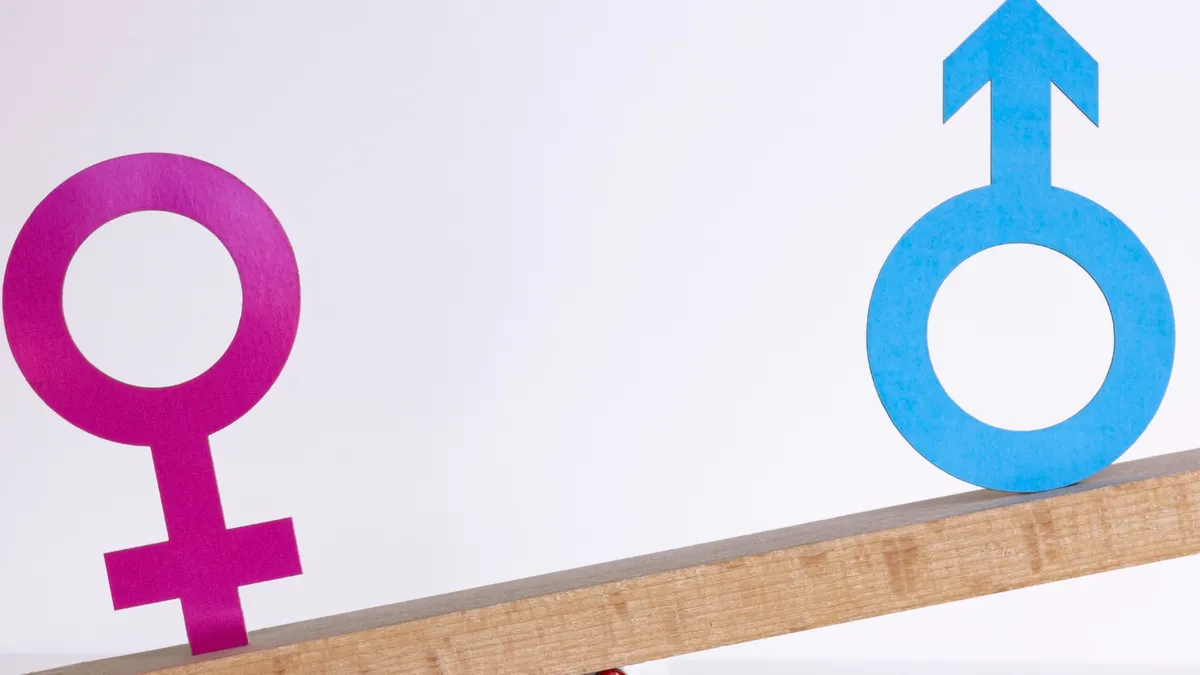Male general counsel and chief legal officers made roughly 15% more than their female counterparts in total actual cash compensation last year, according to Major Lindsey & Africa’s recently released 2022 Global In-House Compensation Survey.
Meanwhile, BarkerGilmore’s 2022 In-House Counsel Compensation Report released several weeks prior found that male general counsel in the U.S. took in nearly 7% more in total compensation than female GCs in 2021.
Both surveys revealed that larger bonuses for men played a significant role in the gender pay gaps identified by the search firms.
For example, while male GCs earned 6% higher base salaries on average than their female counterparts last year, their actual bonuses were 18% larger, according to Major, Lindsey & Africa’s report.
The BarkerGilmore survey found an even greater disparity. It reported that base pay for male GCs was just 2% greater than women in 2021, but their bonuses were roughly 22% higher on average ($134,000 compared to $110,000).
Subjective metrics
Bonuses are typically based on both individual and company performance.
“While a company’s performance is usually determined by objective facts, subjective judgments are common when assessing individual performance,” the Major, Lindsey & Africa report said. “This opens the door to implicit biases that can brew gender inequality into a company’s compensation decisions.”
Susan Hackett, CEO of Legal Executive Leadership, made a similar point about the performance measures used to determine bonuses.
“Unless the criteria are absolutely objective in measurement and unless they are based on actual performance and not the likelihood that the GC will have to be a self-proponent lobbying for a higher amount, women will be more likely to be short-changed,” Hackett told Legal Dive.
Pandemic impact
The issue of implicit bias regarding gender was exacerbated by the global COVID-19 pandemic, according to the Major, Lindsey & Africa report.
Women were already responsible for the lion’s share of childcare and housework, and pandemic-driven factors increased the disparity.
Additionally, a 2021 University of Connecticut study cited by Major, Lindsey & Africa found empirical evidence that women working remotely during the pandemic were interrupted more frequently than their male colleagues, including by personal responsibilities.
“With women long responsible for a disproportionate share of childcare and housework duties, the sad reality is that, for many female attorneys, working from home has become a 24/7 proposition over the last year,” said Edina Beasley, managing director with MLA’s In-House Counsel Recruiting practice.
“Unfortunately, one driver of this growing gender pay gap – especially in terms of bonuses, which are in many ways decided by subjective judgment – could be the bias that women are less invested in their work because they are also focused on domestic tasks,” she continued.
Experience Gap
Hackett said another factor in the bonus disparity could be that many women have been in their GC and CLO roles for fewer years than men, as company efforts to diversify their leadership positions have gained greater momentum in recent years.
These newer legal department leaders may be more focused on securing the base salaries they feel they deserve rather than establishing strong bonus and long-term incentive arrangements, said Hackett, former senior vice president and general counsel at the Association of Corporate Counsel.
BarkerGilmore’s 2021 In-House Counsel Compensation Report noted female GCs were 12 percentage points more likely to have been in their current roles for five years or less than their male counterparts.
Both BarkerGilmore’s 2021 report and its 2022 edition found that long-term incentives were another area separating male GC pay from their female peers, though to a lesser degree than bonuses.
Another factor constraining women’s salaries “may be that women hold fewer CLO and GC positions,” according to the Major, Lindsey & Africa report.
Respondents to its global survey were 56% male, 41% women and 3% preferred not to say or listed “other” in response to the question about gender.
Addressing the problem
The Major, Lindsey & Africa report highlights steps companies can take to address the gender pay gap, including company-wide implicit bias programs.
Another suggestion is for companies to use hard data to inform compensation and promotion decisions rather than utilizing subjective metrics.
Additionally, employers are advised to move away from asking job candidates about their current compensation, as doing so can perpetuate the gender pay gap. Instead, employers should ask candidates for their compensation expectations and pay the market rate.
However, it will likely take time before implementation of these measures will make a significant dent in the gender pay gap.
The target bonuses for male GCs in 2022 are 43% higher than those for their female counterparts, the Major, Lindsey & Africa report found.
“Our survey’s findings highlight the importance of continuing to call attention to ongoing pay inequities between male and female attorneys, as well as the need to make up for the progress lost during the pandemic in narrowing the gender pay gap,” Beasley said.



















